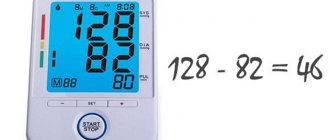Blood pressure is a value that shows how hard the blood presses on the walls of blood vessels. It is an important indicator of the state of the human cardiovascular system.
It happens that, under the influence of certain factors, a pressure reading of 100 to 100 appears on the tonometer, which plunges people into a state of panic.
Is this kind of blood pressure dangerous, and what to do in this case - further in the article.
What does 100 x 100 pressure mean?
The normal pressure is considered to be 120/80. The difference in ratios should be no more than 30-40 mmHg. Art.
However, even in completely healthy people, these indicators can change depending on certain conditions (physical activity, emotional outbursts, fatigue).
When evaluating the measurements taken, it is necessary to pay attention to the value of the upper and lower blood pressure indicators.
Systolic is the upper blood pressure in the vessels at the moment of maximum contraction of the heart.
Diastolic is the lower blood pressure in the arteries when the heart muscle relaxes.
A decrease in the parameters of the upper value to 100 mm and an increase in the lower value to the same figure indicates isolated diastolic hypertension and requires close attention to this problem.
Characteristic symptoms
Isolated diastolic hypertension, what this means, has now become clear. But you need to find out what symptoms accompany the disease in order to consult a doctor in time. The main manifestations of pathology are:
- unexpressed headaches, accompanied by dizziness and weakness;
- blurred vision, flickering “spots”, blurred image;
- shortness of breath that occurs regardless of physical activity;
- weakening of the capillary walls, manifested by periodic nosebleeds.
During periods of exacerbation of the disease, a person feels discomfort, his performance decreases, and emotional and physical decline is noted. Since pressure 100/100 is uncertain, that is, it is not clear which drugs can improve well-being in a particular situation, it is better not to self-medicate. You should contact a specialist to find out the reasons for such tonometer readings; he will select a suitable treatment regimen.
Causes of pathology
The following factors influence blood pressure readings:
- excessive physical activity;
- hereditary predisposition;
- insufficient amount of iodine in the body;
- overwork;
- nervous breakdowns;
- stimulants contained in coffee and tea;
- misuse of medications;
- unsuitable climatic conditions;
- hormonal disorders in pregnant women;
- obesity;
- chronic diseases;
- poor nutrition;
- weather changes (atmospheric pressure surges);
- alcohol and smoking abuse.
The lack of difference between the lower and upper pressure indicators poses a serious threat to life. During this period, a person needs urgent hospitalization and examination.
How it manifests itself
Increased blood pressure is called hypertension and is accompanied by the following symptoms:
- increase in tinnitus;
- dizziness;
- darkening of the eyes;
- pressing pain in the back of the head;
- pain in the heart area;
- the appearance of nausea (sometimes vomiting);
- nosebleeds;
- panic state;
- increased heart rate;
- increased sweating;
- redness of the face;
- numbness of fingers;
- increased heart rate;
- trembling (tremor) of the arms and legs;
- difficulty breathing.
Low blood pressure (hypotension) is characterized by the following symptoms:
- weakness, apathy;
- drowsiness;
- pallor;
- cold damp skin;
- thirst;
- pain in the chest area;
- visual dysfunction;
- fainting;
- rapid breathing.
Pressure surges provoke disturbances in the functioning of the cardiovascular system and internal organs.
To exclude the development of complications, if any clinical signs appear, it is necessary to undergo an examination and find out the reason for the deviation of pressure readings from the norm.
How dangerous
Approximation of blood pressure parameters to 100 to 100 is very dangerous. During this period, the entire load falls on the blood vessels.
A complete convergence of values can provoke a cessation of the circulatory system, which subsequently leads to death.
Incorrect treatment can only worsen the condition, so to get qualified help you need to contact a cardiologist.
Blood pressure disturbances in the first (initial) trimester of pregnancy are unsafe.
The connecting placenta consists of an interlacing of blood vessels of the mother and fetus, and the course of pregnancy, life and health of the unborn child directly depend on the stability of the woman’s blood flow.
Repeated decrease in systolic blood pressure to 100 mm Hg. Art. indicates a malfunction of the heart, nervous system or kidneys.
An increase in diastolic blood pressure can confirm functional changes in the kidneys, decreased elasticity of blood vessels, internal bleeding, as well as cardiac disorders.
Symptoms
Diastolic pressure within 89 mm Hg. Art. is considered its maximum indicator.
- indicators of 110/85 are considered normal;
- 100/90 is a sign of possible hypotension or hypotension;
- 100/100 indicates possible hypertension;
- Hypertension is diagnosed if one or both values are consistently above normal.
At a value of 100/100, there may be partial or complete absence of pulse pressure - the difference between both indicators, often with a pulse of more than 100 beats per minute.
Reduced systolic causes the following symptoms:
- severe headaches;
- prostration;
- dizziness;
- severe anxiety;
- disorientation;
- tearfulness;
- fatigue;
- reluctance to work;
- lack of air;
- sensitivity to weather changes;
- nausea and loss of coordination;
- bad dream.
And also read on our website: What does blood pressure 130 over 100 mean - reasons, what to do and what to take to normalize blood pressure?
Increased diastolic:
- migraine;
- pulse 100 or more;
- weakness;
- vomit;
- nosebleeds;
- pain in the back of the head;
- deterioration of visual function;
- dizziness;
- sensation of noise and ringing in the ears;
- labored breathing;
- chest pain;
- dyspnea;
- Sometimes it is difficult for a person to express his thoughts and talk in general.
Will the pathology go away on its own?
If the indicator 100 is not a constant measurement result, but an isolated case, then there is no need to worry. Such pressure does not always indicate pathological changes in the body, but may be the result of ordinary physical fatigue.
To normalize blood pressure, just relax and unwind.
If this parameter is regular, the formation of atherosclerotic plaques is possible, which can be the beginning of the formation of atherosclerosis.
You should not hope that the pathology will go away on its own. But uncontrolled use of medications to normalize blood pressure can provoke a sharp decrease or increase in blood pressure and contribute to the development of irreversible processes.
Pulse
At this pressure, you can observe a high pulse. A similar reaction of the body can happen for the following reasons:
- If the pressure was caused by bleeding due to injury or chronic disease. The pulse increases at this time.
- State of shock.
- Pregnancy. The pulse increases noticeably during pregnancy. This occurs due to an increase in blood volume and the formation of an additional circulation.
It happens that at such pressure the pulse is in a normal state. This should not cause alarm, even for pregnant women. In other cases, you should immediately consult a doctor.
Various changes in pressure and an increase in pulse to 90 or higher may indicate the development of neoplasms.
If your pulse is very high, the main thing is not to panic and relax as much as possible. This will allow you to regulate your own breathing and relieve an attack of tachycardia.
What to do
In some cases, to normalize blood pressure it is enough:
- change your daily routine;
- exclude salty, fatty and spicy foods from consumption;
- avoid stressful situations;
- eradicate bad habits (smoking and drinking alcohol);
- spend time in the fresh air as often as possible;
- Constantly perform feasible physical exercises.
If there is a persistent persistence of pressure parameters of 100 to 100, you should immediately consult a doctor.
How do I know that I have won 100 thousand rubles?
There are three ways to find out about your winnings:
- Enter the 16-digit number of your certificate (it can be viewed on the State Services portal) on the lottery website - bonuszazdorovye.rf.
- Check notifications in your personal account on State Services.
- Winners should also receive a push notification about their winnings.
How long is a new vaccination certificate valid? More details
First aid
Only a doctor can diagnose the disease and prescribe medications according to the symptoms, so you should not self-medicate.
To alleviate the patient’s condition with instability of pressure, it is necessary:
- provide access to fresh air;
- calm a person down;
- unbutton clothes that make breathing difficult;
- sit on a chair, put a pillow under the lower back;
- exclude any physical activity;
- control blood pressure.
When the pulse increases and chest pain occurs, nitroglycerin is used.
Treatment
Since the causes and treatment are individual for each person (depending on the severity and clinical manifestations), medications and folk remedies are prescribed after assessing the patient’s condition.
Drug therapy
Depending on the blood pressure parameters, the drugs are also different:
- vasodilators - normalize blood circulation and promote relaxation of blood vessels;
- diuretics (for swelling) - remove fluid from the body, reduce blood pressure;
- calming - stabilize the emotional state;
- cardiac glycosides - normalize heart rate.
You must take heart medications strictly as prescribed by your doctor (following the rules of administration and dosage)!
Folk remedies
When the pressure is 100 to 100, the use of traditional medicine as an auxiliary treatment method helps.
To lower blood pressure, medicinal herbs are used in the form of tinctures, decoctions, and teas:
- hawthorn - improves heart function and normalizes pulse;
- calendula - has a diuretic property, reduces blood pressure;
- corn - improves blood circulation;
- mistletoe - relieves spasm of blood vessels;
- motherwort, lemon balm - calms the nervous system.
The use of any medicinal herbs should be agreed with a doctor due to individual intolerance to plants and side effects!











